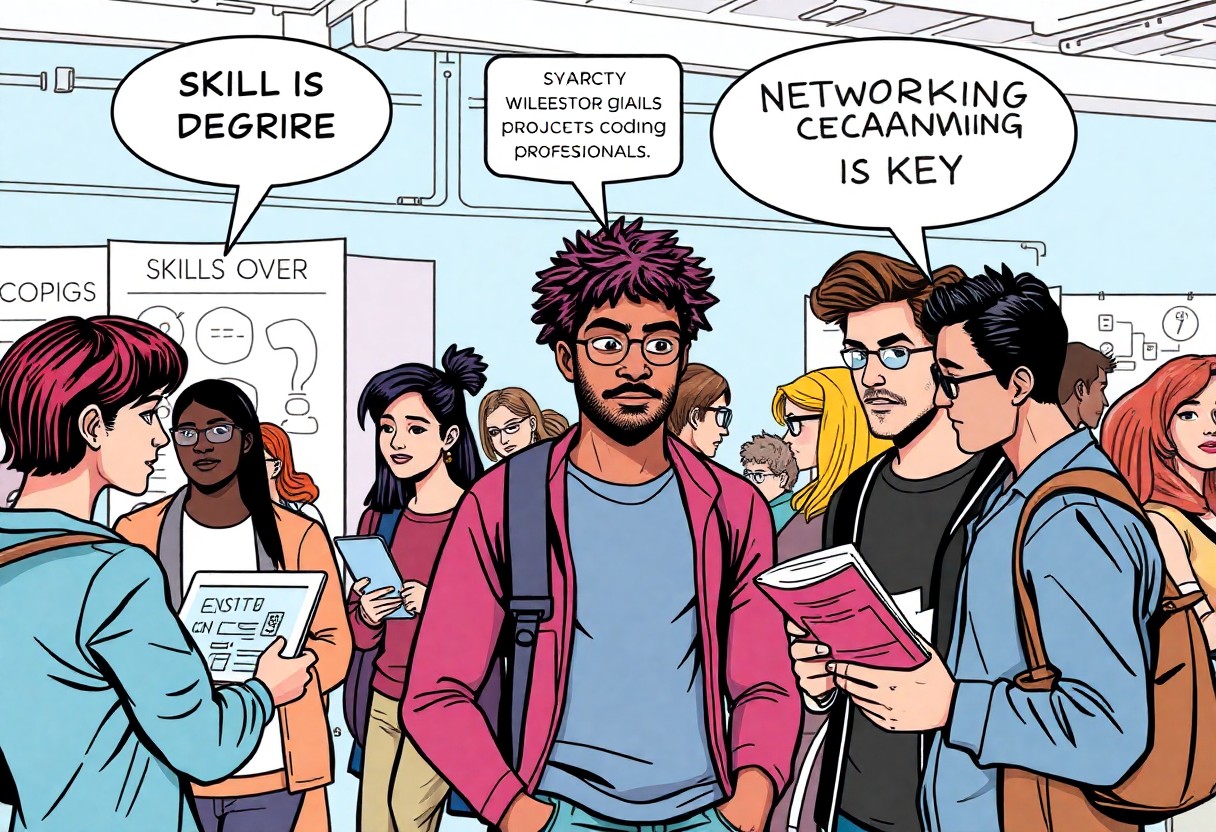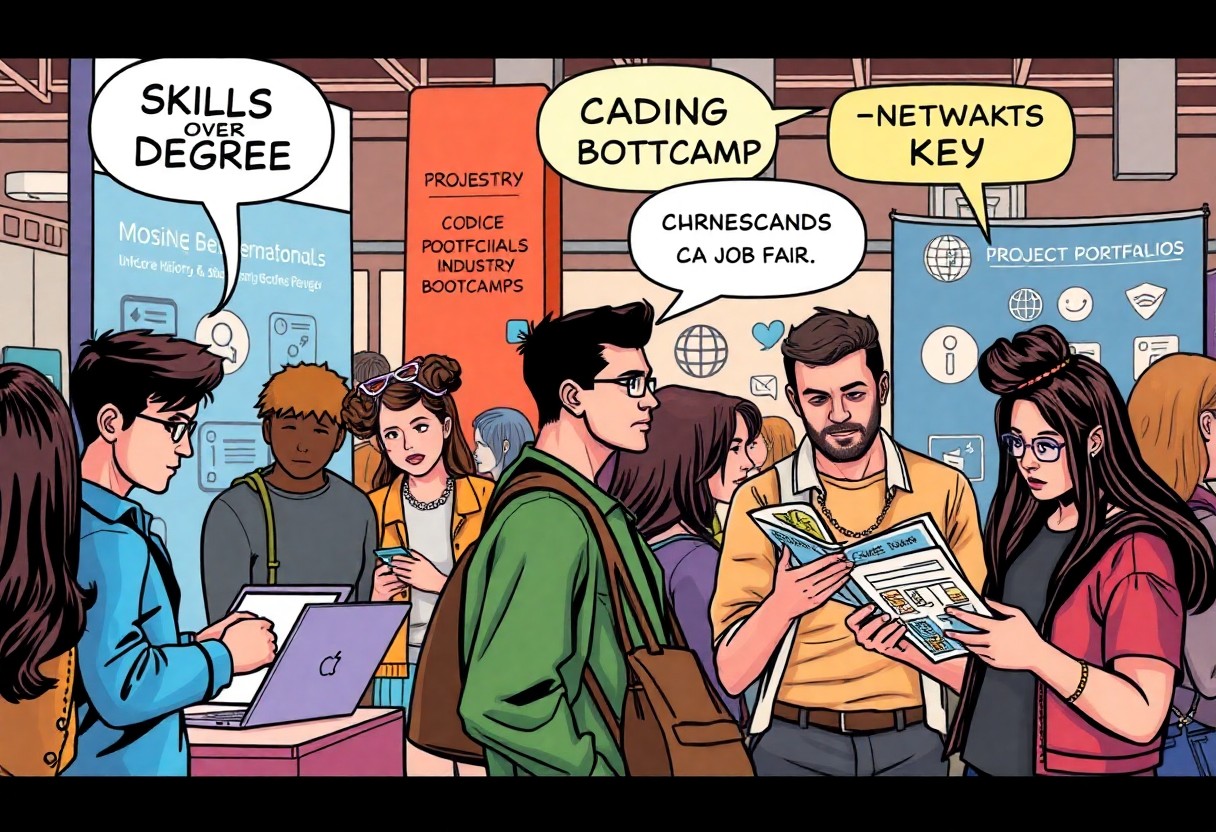There’s a growing demand for software developers, and you don’t need a formal computer science degree to break into the field. I’ll share practical strategies that helped me, including building a strong portfolio, mastering in-demand programming languages, and leveraging networking opportunities. It’s important to showcase your skills through personal projects and contributions to open-source platforms. By focusing on these effective methods, you can increase your chances of landing a role in this thriving industry, even without a traditional background.
Key Takeaways:
- Build a strong portfolio showcasing personal projects, coding skills, and relevant technologies.
- Enhance your network through meetups, online communities, and social media platforms related to tech.
- Apply for internships or entry-level positions; practical experience can outweigh formal education.
Understanding the Software Development Landscape
Maneuvering through the software development landscape requires a clear grasp of its diverse sectors and technologies. Whether it’s web development, mobile apps, or cloud computing, each niche has unique needs and opportunities. Staying updated with industry trends and innovations will provide an edge in securing a role. Your understanding of different programming languages, frameworks, and tools will define your adaptability and attractiveness to potential employers.
Current Industry Demand
The demand for software developers has surged, with estimates indicating over 1.4 million new jobs in the U.S. alone by 2026. Industries such as finance, healthcare, and education are increasingly turning to technology, creating a consistent need for talent. Companies seek developers who can solve real-world problems and bring innovative solutions to the table, making now an ideal time to enter the field.
Essential Skills and Tools
Key skills include proficiency in programming languages like JavaScript, Python, or Java, as well as familiarity with version control systems, particularly Git. Mastering frameworks such as React for front-end or Django for back-end development can significantly enhance your job prospects. Additionally, understanding Agile methodologies and software development lifecycles becomes advantageous as these practices are widely adopted in many organizations.
In addition to programming languages and frameworks, becoming adept at using tools like Docker for containerization or JIRA for project management is beneficial. I’ve found that contributing to open-source projects is an excellent way to practice these skills and showcase your abilities. Building a solid foundation in databases, APIs, and testing practices will further bolster your qualifications. Exploring online courses, coding bootcamps, or local workshops can bridge any knowledge gaps and connect you with community resources.
Building Relevant Skills
Skill acquisition becomes vital without a traditional computer science background. Focus on programming languages and frameworks that are in demand, such as Python, JavaScript, or Java. Utilize resources like coding bootcamps, online tutorials, and coding challenges to build a solid foundation. The goal is to develop not only technical skills but also problem-solving abilities that employers value.
Online Learning Resources
Numerous platforms offer comprehensive courses tailored to aspiring software developers. Websites like Coursera, edX, and Udacity provide structured learning paths in various programming languages and technologies. For a more interactive approach, freeCodeCamp and Codecademy offer hands-on exercises and projects that enhance understanding while allowing you to practice real-world coding scenarios.
Practical Projects and Open Source Contributions
Engaging in personal projects not only solidifies your coding skills but also demonstrates your competence to potential employers. Start with small, manageable projects, such as building a web app or creating a simple game, and gradually tackle more complex tasks. Contributing to open source projects on platforms like GitHub allows you to gain valuable experience while collaborating with other developers, showcasing your skills within a community.
Through practical projects, I created a simple budgeting application that helped me apply my knowledge of JavaScript and React. Contributions to open-source projects, such as fixing bugs or adding features, provided real-world experience and improved my coding proficiency. Over time, these experiences not only built my portfolio but also expanded my network, connecting me with experienced developers who offered mentorship and guidance.
Crafting Your Resume and Portfolio
Developing an impactful resume and portfolio is imperative for showcasing your skills and experiences to potential employers. Focus on clear formatting, using action verbs and specific accomplishments. Tailor your resume for each job application, emphasizing relevant experiences that align with the role. Include a link to your online portfolio, which presents your coding projects, technical skills, and any contributions to open-source initiatives.
Highlighting Transferable Skills
Emphasize transferable skills that demonstrate your capability to thrive as a software developer. Skills such as problem-solving, communication, and teamwork gained from previous jobs or academic experiences can set you apart. Provide examples of how you’ve utilized these skills effectively in past roles or projects, making it clear how they apply to the tech industry.
Showcasing Personal Projects
Your personal projects provide tangible proof of your coding ability and passion for technology. When displaying these projects, detail the technologies and methods used, the challenges faced, and how you overcame them. A well-organized portfolio can include a mix of web applications, mobile apps, or tools you’ve developed, showcasing the breadth of your skills and creativity.
Personal projects offer you a chance to demonstrate not just technical skills, but also your ability to take an idea from conception to completion. For instance, I once created a budgeting app that integrated APIs for real-time currency conversion. This project showcased my proficiency in JavaScript and RESTful APIs, and I included thorough documentation in my portfolio to explain my approach and thought process. Highlighting such projects not only enriches your portfolio but also gives interviewers insight into your dedication and problem-solving abilities.
Networking and Building Connections
Building a strong network is important for breaking into software development without a formal CS background. Engaging with professionals can open doors to job opportunities, mentorship, and valuable industry insights. Utilize both online and offline avenues to create meaningful connections that can support your career growth.
Leveraging Social Media
Utilizing platforms like LinkedIn and Twitter can significantly enhance your visibility in the software development community. I connect with industry leaders by following them, sharing relevant content, and participating in discussions. This engagement not only broadens your network but also positions you as an informed candidate eager to learn.
Attending Meetups and Conferences
Participating in local meetups and conferences allows for face-to-face interaction with like-minded individuals and industry professionals. Engaging in these settings can lead to potential job leads, partnerships, and collaborations. I find attending talks and workshops invaluable, as they provide both knowledge and opportunities to network.
Conferences and meetups often feature networking sessions designed specifically for attendees to connect. I recommend seeking focused events, such as hackathons or coding bootcamp showcases, where you can demonstrate your skills and meet potential employers in a relaxed environment. Many professionals share their stories of landing jobs through casual conversations at these gatherings, emphasizing the importance of introducing yourself and following up with new contacts promptly. This proactive approach can lead to job referrals and mentorship opportunities crucial for growth in the tech field.
Preparing for Technical Interviews
Mastering the technical interview process significantly boosts your chances of landing a software development role. I focused on understanding key areas such as algorithms, data structures, and system design to improve my skills. Joining coding boot camps and practicing on platforms like LeetCode or HackerRank helped me simulate real-world problems, enhancing my problem-solving abilities and increasing my confidence.
Common Interview Formats
Top tech companies often use a mix of whiteboard coding, paired programming, and take-home assignments during interviews. In whiteboard coding, I had to explain my thought process while solving problems live. Paired programming mimicked working in a team environment, allowing me to demonstrate my collaboration skills. Each format assesses both technical skills and communication, which are vital in a development role.
Tips for Technical Assessments
Focusing on practice is necessary for excelling in technical assessments. I spent hours on coding problems, paying attention to time complexity and space efficiency of my solutions. Use a structured approach: first clarify the problem, then outline your solution before coding. Mock interviews with peers also refined my skills and helped me receive constructive feedback. Recognizing the need for continuous improvement through self-assessment is key.
- Practice regularly
- Focus on algorithms
- Utilize online platforms
- Engage in mock interviews
- Seek feedback
To further enhance performance on assessments, I adopted strategies that included taking practice tests under timed conditions. Reviewing my solutions post-assessment allowed me to identify mistakes and learn what alternative solutions I could have employed. A correct understanding of the interview expectations was vital, ensuring I was prepared for both coding challenges and system design questions. Recognizing that preparation is an ongoing process positioned me for success.
- Time yourself
- Review solutions
- Learn from mistakes
- Understand interview expectations
- Keep practicing

Additional Factors to Consider
Besides skills and experience, there are additional factors that can influence your chances of getting hired in the software development field. These include understanding industry trends, building a professional network, and proactively seeking feedback. Consider the following:
- Enhance your personal branding through online platforms.
- Attend meetups and conferences to connect with industry professionals.
- Leverage social media for visibility and networking opportunities.
This comprehensive approach will broaden your potential job opportunities.
Internships and Apprenticeships
Internships and apprenticeships offer invaluable real-world experience that can significantly boost your resume. I found that many companies value practical exposure over a traditional degree. By participating in these programs, you can develop hands-on skills, establish industry connections, and showcase your commitment to growing in the field.
Continuous Learning and Adaptability
The tech industry evolves rapidly, making continuous learning imperative for success. Embracing new programming languages, tools, and methodologies can keep you relevant and competitive. Regularly dedicating time to online courses or coding challenges ensures you stay adept at problem-solving while also demonstrating your adaptability to potential employers.
Staying current requires more than just a few courses; I leverage resources like coding bootcamps, MOOCs, and tech blogs to gain insights into emerging technologies and industry practices. Engaging with community forums can expose you to different perspectives and solutions, enhancing your adaptability. I dedicate at least a few hours each week to refine my skills, which not only builds my confidence but also establishes credibility among peers and employers.
Final Words
Taking this into account, I believe that you can successfully transition into software development without a CS background by focusing on practical skills, building a strong portfolio, and networking effectively. I encourage you to actively seek coding communities and online resources to enhance your knowledge. If you’re looking for advice, check out this discussion on Whats the optimal route to becoming a software engineer …, as it offers valuable insights from others on a similar path. Your dedication and perseverance will set you apart in this competitive field.
FAQ
Q: Is it possible to become a software developer without a computer science degree?
A: Yes, many successful software developers come from non-CS backgrounds. Skills can be acquired through self-study, coding bootcamps, and practical experience.
Q: What are the best resources for learning programming without a formal degree?
A: Online platforms like Codecademy, freeCodeCamp, and Coursera offer comprehensive courses. Additionally, participating in coding communities and open-source projects can provide hands-on experience.
Q: How can I improve my chances of getting hired as a software developer?
A: Build a strong portfolio showcasing projects, contribute to open-source, network with professionals in the field, and tailor your resume to highlight relevant skills and experiences.
